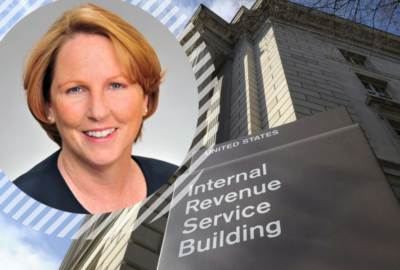IRS digs out from pandemic-era challenges, but struggles on some hiring goals, watchdog tells Congress
The Internal Revenue Service is answering more calls and providing help to taxpayers at levels not seen since the start of the COVID-19 pandemic.
The Internal Revenue Service is answering more calls and providing help to taxpayers at levels not seen since the start of the COVID-19 pandemic.
But the National Taxpayer Advocate, in her annual report to Congress, is telling the IRS that “business as usual” isn’t good enough, and that the agency needs to keep improving its level of service to the public.
The annual report describes 2023 as a year of “extraordinary transition for the IRS” and taxpayers, and that with recent improvements in IRS operations, “despair has turned to cautious optimism.”
“Overall, the magnitude of successes exceeded the areas of weakness in 2023, and most metrics showed significant improvement from the depths of the [COVID-19] pandemic,” National Taxpayer Advocate Erin Collins wrote.
The report finds the IRS in 2023 eliminated most of its tax return backlog, issued most tax refunds on time and answered taxpayer telephone calls at pre-pandemic levels.
“The good news is that, with limited exceptions, we are back to business as usual,” the report states. “The bad news is that the baseline level of ‘business as usual’ was not good enough.”
IRS Commissioner Danny Werfel said in a statement that the taxpayer advocate “raises a number of very important areas that we are looking at to make improvements,” by tapping into multi-year Inflation Reduction Act funds.
“Many of these issues identified in her report ultimately depend on adequate IRS resources,” Werfel said. “This is another reason why the Inflation Reduction Act funding and our annual appropriations are so critical to making transformational changes to the IRS to help taxpayers and the nation.”
The IRS is tapping into about $60 billion of funds from the Inflation Reduction Act to rebuild its workforce and modernize its legacy IT systems over a decade.
But the report notes that “the IRS continues to struggle to hire qualified candidates in many key areas.”
“If the IRS does not make significant changes, these staffing shortages will compound and pose significant threats to federal tax administration and taxpayer rights,” the report states.
The agency hired more than 30,000 employees in fiscal 2023, but much of that hiring is meant to offset a high rate of workforce attrition in the coming years.
About 18% of the IRS workforce is eligible for retirement, and about 37% will be retirement-eligible in the next five years.
“Although employee turnover is part of the normal course of business, the elevated rate of current IRS employee turnover should concern taxpayers and the IRS alike,” the report states.
The National Taxpayer Advocate is also urging the IRS to focus on training its new hires.
“Hiring new employees fills staffing needs, but replacing experienced employees with new ones is typically not an equal trade because of decreases in productivity and customer service quality,” the report states.
The 2023 Federal Employee Viewpoint Survey shows nearly a quarter of IRS employees said they didn’t receive the training they need to do their jobs well.
“It is critical that the IRS make comprehensive training a priority and ensure that new hires receive adequate training before they are assigned to tasks with taxpayer impact,” the IRS states.
The IRS used its direct hire authority to bring some new employees onboard more quicky, but the report says the agency still takes too long to hire.
“The hiring lag is shorter than it used to be, but the IRS still needs to find ways to make it shorter,” the report states.
The report states the lengthy time to hire is “likely causing the IRS to lose qualified candidates.”
The agency’s time to hire averaged 134 days in 2023. But in cases where the IRS didn’t use its direct hire authority, new hires coming into the agency waited more than 193 days.
“Most candidates don’t have the financial resources to wait that long for a paycheck,” the report states. “Many end up taking other jobs while they are waiting for the clearance process to play out.”
The report also finds the IRS should do more targeted advertising for candidates, and that it often struggles to offer competitive pay.
Among her recommendations, the National Taxpayer Advocate urges the IRS to consider additional recruitment and retention bonuses, as well as incentives for workers with critical skills to join the agency.
The report also recommends the IRS staff up its Human Capital Office to manage its hiring surge.
It also recommends the IRS work with the Office of Personnel Management and Congress to obtain more pay flexibility for hard-to-fill positions.
“The reality is that federal pay is competitive for some jobs but not for others. In some job categories (e.g., revenue agents who audit large partnerships and corporations), the IRS seemingly has trouble hiring,” the report states.
IRS answers 29% of calls from taxpayers
During FY 2021, amid pandemic delays, IRS employees answered about 11% of its calls. That improved significantly in FY 2023, when IRS employees answered 29% of its calls.
IRS says its level of phone service exceeded its 85% goal last year, but the National Taxpayer Advocate says that metric comes with a few caveats.
The figure doesn’t account for all taxpayer calls — just calls routed to the IRS Accounts Management division. It also doesn’t account for taxpayers who hung up before getting through to an IRS employee.
“But taxpayers calling the IRS rarely have a spontaneous epiphany and decide they don’t need to speak with the IRS after all. They generally hang up because something about the interaction — perhaps the waiting time, perhaps the phone tree, perhaps being routed for an automated response — deters them from proceeding.”
The National Taxpayer Advocate said increased staffing helped the IRS improve its level of phone service. The IRS last year hired more than 5,600 new call center representatives to answer calls.
The agency also received fewer calls. It received 282 million total calls in FY 2021 but only saw 93 million calls in FY 2023.
“Taxpayers generally call the IRS when they are experiencing problems, so the drop in call volume last year was a good sign that overall taxpayers’ problems have declined,” the report states.
The IRS also substantially reduced average wait times on its toll-free lines from 29 minutes in FY 2022 to 13 minutes in FY 2023.
Backlogs persist
While the IRS has mostly cleared its backlog of paper individual tax returns, the agency still faces challenges with some of its paper-based workload.
The report finds the IRS is still dealing with higher-than-average backlogs of taxpayer correspondence and amended tax returns.
The IRS in October 2023 had a backlog of nearly 2 million unprocessed amended returns — about four times as many as it saw in calendar year 2019.
Its volume of taxpayer correspondence more than doubled over the same period. The IRS had a backlog of nearly 2 million pieces of correspondence in 2019, but reached 4.3 million pieces in late 2023.
The report attributes much of the paper backlog to the Treasury Department’s decision to prioritize answering telephone calls over processing amended returns and correspondence.
Customer service representatives in the IRS’ Accounts Management division carry out both tasks.
The IRS staffed up its telephone lines during last year’s filing season to handle most incoming calls during peak periods.
But during non-peak periods, the report states employees often were “simply sitting around waiting for the phone to ring.”
During the 2023 filing season, customer service reps spent more than a third of their time waiting to receive calls – about 1.27 million hours total.
The report said that downtime translates to more than 650 unproductive staff years, and that employees could have spent that time processing paper and taxpayer correspondence.
“The IRS cannot easily shuffle employees back and forth between answering phones and processing correspondence, so unproductive employee time was the price it had to pay to improve telephone service levels,” Collins wrote. “Going forward, the IRS needs to find a way to move employees between those two functions more nimbly.”
Copyright © 2024 Federal News Network. All rights reserved. This website is not intended for users located within the European Economic Area.
Jory Heckman is a reporter at Federal News Network covering U.S. Postal Service, IRS, big data and technology issues.
Follow @jheckmanWFED






